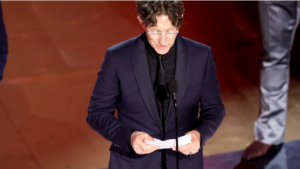The Zone of Interest is about the danger of ignoring atrocities – including in Gaza

Jonathan Glazer accepts the Best International Feature Film award for ‘The Zone of Interest’ at the 2024 Oscars
Naomi Klein writes in The Guardian on 14 March 2024:
It’s an Oscar tradition: a serious political speech pierces the bubble of glamour and self-congratulation. Warring responses ensue. Some proclaim the speech an example of artists at their culture-shifting best; others an egotistical usurpation of an otherwise celebratory night. Then everyone moves on.
Yet I suspect that the impact of Jonathan Glazer’s time-stopping speech at last Sunday’s Academy Awards will be significantly more lasting, with its meaning and import analyzed for many years to come. Glazer was accepting the award for best international film for The Zone of Interest, which is inspired by the real life of Rudolf Höss, commandant of the Auschwitz concentration camp. The film follows Höss’s idyllic domestic life with his wife and children, which unfolds in a stately home and garden immediately adjacent to the concentration camp. Glazer has described his characters not as monsters but as “non-thinking, bourgeois, aspirational-careerist horrors”, people who manage to turn profound evil into white noise.
Before Sunday’s ceremony, Zone had already been heralded by several deities of the film world. Alfonso Cuarón, the Oscar-winning director of Roma, called it “probably the most important film of this century”. Steven Spielberg declared it “the best Holocaust movie I’ve witnessed since my own” – a reference to Schindler’s List, which swept the Oscars 30 years ago.
But while Schindler List’s triumph represented a moment of profound validation and unity for the mainstream Jewish community, Zone arrives at a very different juncture. Debates are raging about how the Nazi atrocities should be remembered: should the Holocaust be seen exclusively as a Jewish catastrophe, or something more universal, with greater recognition for all the groups targeted for extermination? Was the Holocaust a unique rupture in European history, or a homecoming of earlier colonial genocides, along with a return of the techniques, logics and bogus race theories they developed and deployed? Does “never again” mean never again to anyone, or never again to the Jews, a pledge for which Israel is imagined as a kind of untouchable guarantee?
These wars over universalism, proprietary trauma, exceptionalism and comparison are at the heart of South Africa’s landmark genocide case against Israel at the international court of justice, and they are also ripping through Jewish communities, congregations and families around the world. In one action-packed minute, and in our moment of stifling self-censorship, Glazer fearlessly took clear positions on each of these controversies.
“All our choices were made to reflect and confront us in the present – not to say, ‘Look what they did then’; rather, ‘Look what we do now,’” Glazer said, quickly dispatching with the notion that comparing present-day horrors to Nazi crimes is inherently minimizing or relativizing, and leaving no doubt that his explicit intention was to draw out continuities between the monstrous past and our monstrous present.
And he went further: “We stand here as men who refute their Jewishness and the Holocaust being hijacked by an occupation which has led to conflict for so many innocent people, whether the victims of 7 October in Israel or the ongoing attack on Gaza.”
